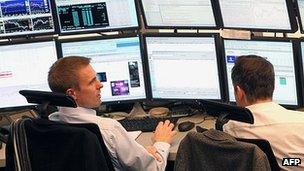Clouds behind eurozone clouds
- Published
- comments

Frankfurt brokers: Bond market jitters look set to continue in 2012
The ancient augurs used to study the flight of birds to determine the will of the gods. Today's European officials scan the bond markets, hoping to read the pulse of the eurozone.
Dates when Italy or Spain have to go to the markets to service their debts are nervously underlined in the calendar.
A successful bond auction produces a collective sigh of relief. The major European cloud is that in the first quarter of this year troubled eurozone countries have to raise hundreds of billions of euros. The borrowing costs that these countries have to pay may make the headlines, but it is the clouds behind the clouds that will come to dominate Europe in 2012.
The darkest cloud is austerity. Deficit reduction is still the mantra. It is being followed faithfully even as the eurozone heads into recession. But some countries appear locked in a downward spiral.
Greece, with its unelected leader, is marching to the EU/IMF tune. The Greek economy this year will contract by a further 3%, having shrunk 6% last year. Its retail sales are down 30%. A quarter of small businesses and shops are closing. There are large withdrawals of funds and much of the money is being moved out of the country.
Yes some debt will be written off, but it is hard not to conclude that Greece faces years of decline. In the meantime negotiations continue over the second bailout deal.
Expensive club fees
Italy too is heading into recession. Growth for 2012 is forecast to be minus 1.6%. At the same time it is implementing 33bn euros (£27.5bn) of spending cuts and tax increases.
Meanwhile Spain's deficit may be higher than the 8% forecast. Its unemployment has risen to a 15-year high. More austerity measures are in the pipeline.
Sooner or later some of these countries risk social upheaval if austerity seems to just pave the way for further hardship. It will raise the question of the price being demanded to stay in the euro club.
Already there is resentment towards Germany for trying to shape other eurozone economies to its own economic model. There are signs that the currency that was supposed to further unite Europe is sowing new divisions.
Another cloud is Italy. The fundamental question of the past year remains unanswered: what happens if an economy as big as Italy needs rescuing?
The main bailout fund, the EFSF, , externalis mired in uncertainty. Foreign investors are sitting on their hands. Hopes are invested in the IMF doing more but, even so, the funds are not in place to rescue Italy.
Sarkozy walks tightrope
France casts a shadow. It may lose its triple AAA credit rating. If it happens it will not only force up its borrowing costs but weaken the eurozone's main bailout - the EFSF.
It will be politically difficult in the midst of an election campaign to impose further austerity measures. And President Sarkozy is vulnerable to the accusation of giving away a chunk of French sovereignty over its budget to Brussels - at the insistence of Germany.
Another long-term controversy lurks on the horizon. The European welfare state is being weakened. Bits are being chipped away in order to cut spending.
For many Europeans strong welfare entitlements defined Europe compared to America. At some stage politicians will have to tell the people that many benefits are not affordable if Europe is to remain competitive.
Then there is democracy. In the past Western Europe and the EU were a beacon of democracy for the East. Now it has two unelected prime ministers. Some people - judging by the polls - seem to prefer rule by technocrats. Others say the eurozone crisis has revealed the failings of democratically elected leaders.
Germany and France are bent on pursuing a form of fiscal union where tax and spending is co-ordinated at a European level., external There is one unanswered question however. If the voters dislike the budget that emerges from talks in Brussels who do they hold responsible? Who do they kick out? Being able to hold leaders to account is one of the hallmarks of democracy.
The political will to keep the eurozone together is not in doubt, but it will be tested again this year. The key remains Germany. Its powerful economy has given it influence it never sought. It is now the undisputed leader of Europe and the "indispensable nation".
Berlin increasingly has the feel of Europe's capital. For the moment the political class is committed to defending the euro. What is still unclear is what price Germany is prepared to pay to keep the eurozone together. Bild - its best-selling paper - had this headline last year: "They all want our money".
The future of the eurozone will turn on the decisions of the German people.